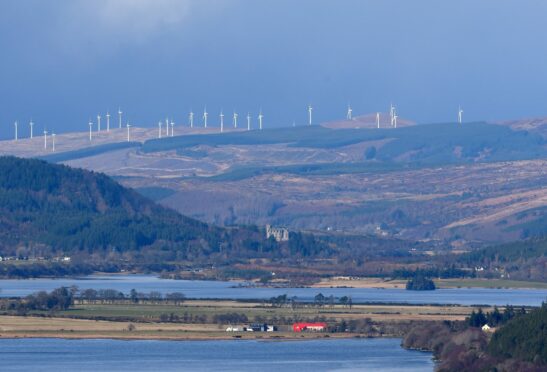
A wilderness protection agency has withdrawn an objection to a wind farm as there are already so many turbines that the land is no longer wild.
NatureScot says it is no longer opposing an extension to a wind farm near the villages of Rosehall and Lairg in Sutherland as the area is no longer wilderness.
People living there have accused the public body responsible for Scotland’s natural heritage of giving up and said the Scottish Government must step in to stop more applications for wind farms or jobs will be lost.
It comes after the National Trust for Scotland called for an end to the development of wind farms in wild areas. Chief executive Philip Long said earlier this month that he recognised the need to develop sources of renewable energy but these should not be to the detriment of natural assets.
Near Rosehall there is the 19-turbine Achany wind farm, which SSE wants to double in size, as well as the 19-turbine Rosehall farm. A 27-turbine farm at Braemore has been given the green light, while there is a proposal for a 14-turbine farm at Braelangwell.
German firm EnergieKontor also wants to erect 11 turbines at Strath Oykel, three miles from Rosehall. In a scoping document, it accepted the size and location of the development would likely have “significant effects upon the environment”.
If each proposal is approved there could be more than 130 turbines surrounding Rosehall and campaign group No Ring Of Steel (NoROS) fears tourists will stop visiting the area.
NatureScot has mapped Wild Land Areas (WLAs) and they have been identified as nationally important in planning policy but there is no legal protection to limit the number of wind turbines.
When asked by the Scottish Government for advice on EnergieKontor’s proposal, Nature Scot said: “This area could not be now considered as qualifying as part of the WLA and may be considered lost. These areas are no longer of the highest wilderness…the landscapes within the proximity of the proposal (up to around 15km) will become characterised by the pattern of wind farm development.”
Ashley Smith, chair of NoROS, who runs Invercassley B&B in Rosehall with his wife, Tracy, said: “It’s like NatureScot has given up on this area, one of the most beautiful parts of Britain. It’s absolutely stunning here but it’s open season for wind farms.
“We feel let down as anyone can just apply for a wind farm and they are popping up left, right and centre. There must be some sort of government strategy that says enough is enough and no more applications can come in for a certain number of years.”
Tracy said: “We’re not against wind farms. But we can’t destroy our wild areas. We’ve got two wind farms and a third with planning permission, then there are another four applications for wind farms. That would be about 130 turbines around our village.
“It’s a small, rural community with a lot of tourism businesses that rely on the countryside. It’s a major salmon fishing area. There are tearooms, B&Bs, hotels.
“People come for the wildness, for the remoteness and for the wildlife. If we’re surrounded by turbines that’s going to put people off.”
Ashley added: “There are going to be job losses. We’ve got two renowned fishing rivers and people come up from down south and from abroad to fish. They also come for the beauty and I have this horrible feeling if we end up with all of these turbines, they will go elsewhere.
“It’s a very fragile business anyway. It works now and it works well but if you add something like this, we’re going to see a huge detrimental effect on our economy.”
NatureScot said it objected to SSE’s Achany Extension and wind farms at Sallachy, near Lairg, because of their effects on wild land quality but the approval of another farm in the area will mean it is no longer wild land.
“In our objective assessment,the granting of consent for Sallachy wind farm by Highland Council means that parts of the area can no longer be considered as wild land and we are required to take this into account in our advice on subsequent proposals,” said NatureScot.
“We have objected to the proposed Strath Oykel wind farm unless it is made subject to a number of conditions to protect the internationally important natural heritage interests in the River Oykel Special Area of Conservation.”
The Scottish Government and Highland Council said it would be inappropriate to comment as ministers and councillors may have to rule on the plans.
Mark Richardson, senior policy manager at industry body Scottish Renewables, said: “Developers of onshore wind farms always take into account landscape issues when building new projects and developers spend many months, and in some cases years, continually monitoring the environment to identify potential impacts and working with statutory bodies and others to mitigate them.
“Onshore wind is vital to Scotland’s economy employing 8,780 jobs and generating nearly £2.5 billion of GVA (gross value added) in 2019.”
SSE Renewables said: “Continuing to develop onshore wind alongside other forms of renewable energy will be vital to achieving net zero targets. We work with authorities and local communities to ensure construction causes the least impact to the environment with sustainability at the heart of all of our developments.”
EnergieKontor did not respond.

Enjoy the convenience of having The Sunday Post delivered as a digital ePaper straight to your smartphone, tablet or computer.
Subscribe for only £5.49 a month and enjoy all the benefits of the printed paper as a digital replica.
Subscribe